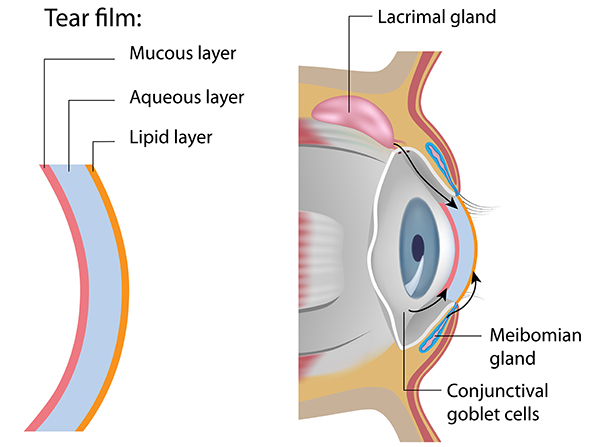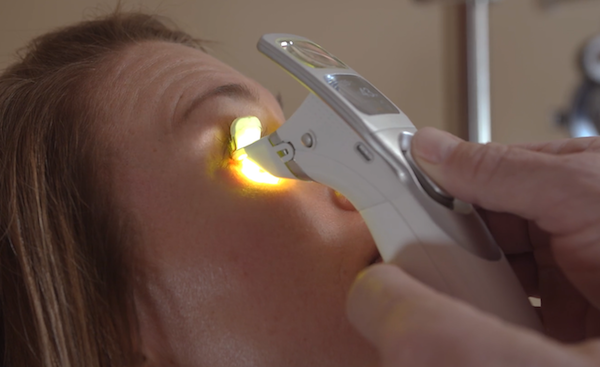If you suffer from dry, itchy, irritated eyes, it’s likely that you’re familiar with artificial tears. But did you know that there is a faster, more effective form of dry eye treatment?
Get relief from chronic dry eye with iLux®, a revolutionary new device that uses gentle, light-based heat to heal blocked tear ducts quickly and comfortably.
Keep reading to learn more about dry eye syndrome and treatment in Livingston, NJ or click the button below to schedule a Dry Eye Consultation today!
What is Dry Eye?
Dry eye syndrome is a common condition that develops because the eyes don’t produce enough tears, which results in itchy, irritated eyes. A healthy layer of tear film is essential to keep your eyes lubricated and comfortable.
What is Tear Film?

Tear film is a protective, watery coating of tears that is comprised of three layers.
- The inner (mucin) layer spreads the aqueous layer over the entire eye as well as protects and nourishes the underlying cornea.
- The middle (aqueous) layer is watery and nourishes the eye with water-soluble proteins. The aqueous layer is produced by the lacrimal glands of the eye.
- The outer oily (lipid) layer prevents the watery layer from draining too fast. The lipid layer is produced by the Meibomian glands.
Each layer of tear film works together to protect and lubricate the eyes, reduce your risk of eye infection, wash away foreign particles, and maintain the overall health of your eyes.
What Causes Dry Eye?
Most cases of dry eye syndrome develop because the eye is not producing enough tears.
There are a variety of reasons for why this could occur:
- Natural changes related to age and menopause
- Side effects of medications such as antihistamines, decongestants, beta blockers, hormone replacement therapy, antidepressants and/or anti-anxiety pills
- Autoimmune disorders such as rheumatoid arthritis or Sjogren’s Syndrome
- Overexposure to screens on mobile devices, computers, or TV
- Side effect of LASIK or other laser eye surgery
Another primary cause of dry eye is the evaporation of the tear film, which can be activated by:
- Meibomian Gland Dysfunction
- Blepharitis, or inflammation of the eyelids
- Exposure to windy, smoky, or dry environments
- Rosacea
- Symptoms of dry eye
- Scratchy, “gritty” feeling
- Blurry vision
- Eye pain and discomfort
- Stinging or burning
- Redness
- Excessive tearing
- Mucus buildup around the eye
Since dry eye can be caused by multiple factors, it’s important to schedule an eye exam with an ophthalmologist to determine the cause of your symptoms. Once your doctor has diagnosed the underlying cause of your dry eye, it will be much easier to prescribe an effective dry eye treatment.
Tests for Dry Eye
Your doctor may perform special tests to diagnose the cause of your dry eye symptoms. Dry eye tests measure the volume and quality of your tears, and/or how long it takes the eye to produce tears.
Your eye doctor may use any of the following tests to check for dry eye:
Schirmer’s Test
The Schirmer’s test is used to determine if enough tears are being produced to lubricate the surface of the eye. If the eyes produce an inadequate amount of tears, your doctor may decide to proceed with a form of dry eye treatment.
Epithelial Staining
Epithelial staining involves administering special eye drops that contain a form of non-toxic diagnostic dye. Once the eye drops are applied to the cornea, the color-changing dye helps identify areas of the cornea where damage has occurred as a result of dry eye syndrome.
Meibomian Gland Evaluation
During a Meibomian Gland Evaluation, your eye doctor will press on the glands of the eyelid to see if oil is being secreted normally.
It’s also important to provide your doctor with a brief medical history, as that may reveal lifestyle and environmental triggers that could be the cause of your dry eye syndrome.
TearLab
TearLab’s chip technology uses a tiny sample of tears to measure osmolarity, or saltiness, of your tears. Your doctor will test both eyes and then calculate your osmolarity number.
Of all dry eye testing available, TearLab has the best predictive value for diagnosing dry eye disease.
How is Dry Eye Treated?

At Associates in Ophthalmology, our team of eye care experts is committed to offering the best treatment for dry eye in Livingston, NJ. We use cutting-edge technology and state-of-the-art procedures to provide patients with long-lasting relief from dry eye symptoms.
In addition to standard dry eye treatment such as artificial tears, prescription medications, and punctal plugs, Associates in Ophthalmology is now offering dry eye treatment with iLux®, a small, portable device used to reduce painful dry eye symptoms.
What is iLUX® Dry Eye Treatment?
iLux is a dry eye treatment device that fits in the palm of your hand. The iLux system allows your eye doctor to provide safe, effective dry eye treatment using gentle heat and compression therapy.
Why is iLux® Effective?
Blocked glands in your eyelid are the primary cause of dry eye syndrome. iLux is a simple in-office treatment that works to unblock the glands by applying gentle heat and pressure to your upper and lower eyelids.
After treatment with iLux, the glands in your eyelids can function normally. This results in sufficient production of meibum, a natural oil that’s needed to keep your tears stable and healthy.

How Does iLUX® Work?
- Your doctor will use the iLux device to view the glands of your eye and determine which areas require treatment.
- The device is then used to gently capture your eyelid between two soft pads.
- Light-based heat is applied through the iLux device to melt meibum inside the blocked Meibomian glands. Your doctor will lightly press your eyelid to expel the meibum and flush blockages from your tear ducts.
How Long Does iLux® Take?
iLux treatment typically takes less than 10 minutes to complete.
What Happens After Treatment?
Most patients feel an improvement in their dry eye symptoms immediately after the iLux procedure, with significant improvement after two and four weeks.
After treatment, you’ll be scheduled for a follow-up visit to assess the results and determine if further treatment is needed. Your doctor may recommend utilizing a warm compress, artificial tears, a sleep mask, or prescription medication to ensure long-lasting relief from dry eye symptoms.
Is iLux® Right For Me?
Only an eye care professional can determine the best dry eye treatment for you. Contact us now to schedule a thorough dry eye evaluation at our eye care office in Livingston, NJ. Our team of experts provides safe, effective solutions for dry eye symptoms so you can see clearly and comfortably!

